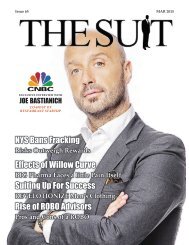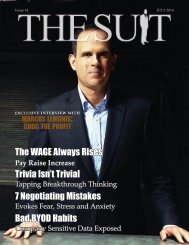One City Built to Last
The news is in: On November 7, 2014, the justices announced they would decide on a lawsuit claiming that the language of the Affordable Care Act doesn’t allow the government to provide tax-credits to low-and-moderate-income health insurance consumers using federally funded Obamacare exchanges operating in more than 30 states. Indeed, there’s a medical quagmire. And there is a lack of communication between doctors, staffing and patients. For example, the Affordable Care Act isn’t just about insurance coverage. The legislation is also about transforming the way health care is provided. In fact, it has brought in new competitors, services and business practices, which are in turn producing substantial industry shifts that affect all players along health care’s value chain. Read Amy Armstrongs story on page 16. On page 21, our reporter Judy Magness, profiles companies all over the country making incredible advances. Take a look at Functional Medicine and the driving breakthroughs in breast cancer while
The news is in: On November 7, 2014, the justices announced they would decide on a lawsuit claiming that the language of the Affordable Care Act doesn’t allow the government to provide tax-credits to low-and-moderate-income health insurance consumers using federally funded Obamacare exchanges operating in more than 30 states. Indeed, there’s a medical quagmire. And there is a lack of communication between doctors, staffing and patients. For example, the Affordable Care Act isn’t just about insurance coverage. The legislation is also about transforming the way health care is provided. In fact, it has brought in new competitors, services and business practices, which are in turn producing substantial industry shifts that affect all players along health care’s value chain. Read Amy Armstrongs story on page 16. On page 21, our reporter Judy Magness, profiles companies all over the country making incredible advances. Take a look at Functional Medicine and the driving breakthroughs in breast cancer while
You also want an ePaper? Increase the reach of your titles
YUMPU automatically turns print PDFs into web optimized ePapers that Google loves.
y peter suciu<br />
OBAMACARE FUELS<br />
Compliance Industry Services<br />
Implementation of the<br />
Affordable Care Act<br />
– less affectionately<br />
known as Obamacare –<br />
has meant a boom in business<br />
for Sharon Bradley,<br />
RN, MBA, CHC, CPHQ,<br />
CPHRM. She is a health care compliance,<br />
quality, and risk management<br />
professional, and one who isn’t angered<br />
by all of the new rules, regulations and<br />
standards for compliance. Her firm,<br />
CRAQ Health Care Consulting, LLC,<br />
based in Day<strong>to</strong>na Beach, Florida, thrives<br />
on meeting government mandates. The<br />
Affordable Care Act contains a whole<br />
host of mandates for health care organizations<br />
and CRAQ, which stands for<br />
Compliance, Risk, Accreditation, and<br />
Quality, is prepared <strong>to</strong> assist organizations<br />
in meeting those requirements. As<br />
president of the firm, Bradley welcomes<br />
involvement with Obamacare.<br />
In fact, helping hospitals, clinics, long<br />
term care facilities and other medical<br />
organizations meet governmental compliance<br />
standards is nothing new for<br />
Bradley. As an independent health care<br />
compliance consultant, Obamacare’s<br />
requirements seem more like another<br />
round of government-issued mandates,<br />
except with a stronger compliance bite.<br />
“Prior <strong>to</strong> the Affordable Care Act, we<br />
had the Deficit Reduction Act, which<br />
had a compliance program but it was<br />
considered more of an ‘involuntaril<br />
manda<strong>to</strong>ry’ situation,” Bradley explains.<br />
“You did not necessarily have <strong>to</strong><br />
have a compliance program, but if you<br />
ran afoul of the government’s rules and<br />
regulations, you could end up paying<br />
significant fines and penalties.”<br />
Today, compliance programs are<br />
manda<strong>to</strong>ry. Bradley welcomes this. In<br />
her opinion, having a robust compliance<br />
program is “the best mitigation strategy”<br />
for avoiding penalties.<br />
Starting her career as a registered<br />
nurse in Florida, she quickly worked<br />
her way up the clinical ladder in<strong>to</strong> management,<br />
and she was put in charge of<br />
quality management, risk management<br />
and compliance. After a stint managing<br />
these issues for two hospitals jointly<br />
owned by a for-profit, multi-hospital<br />
health system, she <strong>to</strong>ok a position<br />
handling corporate quality management<br />
and compliance for Tenet, a large,<br />
for-profit, multi-hospital system. In 2007,<br />
Bradley became a senior vice president<br />
with Marsh, a global firm specializing in<br />
risk and insurance services. She was consulting<br />
for hospitals across the country,<br />
a skill set that came in handy when she<br />
was downsized in 2013, and it was then<br />
that Bradley decided <strong>to</strong> hang out her<br />
own shingle.<br />
“All of my experience developed my<br />
taste and approach in how I consult with<br />
hospitals, ambula<strong>to</strong>ry care centers, provider<br />
practices and long-term care centers,”<br />
Bradley said. “My clients <strong>to</strong>day<br />
appreciate the fact that I have been <strong>to</strong><br />
hundreds of hospitals and other health<br />
care organizations across the nation and<br />
I have seen how others handle compliance.<br />
I have seen what works well and<br />
what does not work well and I bring<br />
those experiences <strong>to</strong> each new client<br />
when I consult.”<br />
She notes that the medical profession is<br />
becoming increasingly dependent on information<br />
technology – particularly with<br />
the new requirements under Obamacare<br />
further mandating electronic medical<br />
records. This dependency should not replace<br />
the human element, which in Bradley’s<br />
estimation, more easily catches errors<br />
in medical records, thus protecting<br />
patient safety more effectively.<br />
“I certainly understand that there are<br />
errors in IT – and I find them when doing<br />
reviews,” Bradley said. “The biggest key<br />
<strong>to</strong> patient safety though is for the medial<br />
professionals <strong>to</strong> engage the patients,<br />
their families and their support systems.<br />
Don’t approach their care as just a rote<br />
set of tasks – but have engaged conversations<br />
with them and with their families.<br />
That is what really keeps them safe.”<br />
Learn more about Bradley and her services<br />
via CRAQ Healthcare Consulting,<br />
LLC, at CRAQhealthcare.com .<br />
THE SUIT MAGAZINE p.37










